How Houseplants are Great for Your Wellbeing
January 19th, 2024 | Categories
Not only can houseplants breathe life, colour, and interest into a home or space, they are great for our general wellbeing. It’s true, humble houseplants offer many benefits to our mental, emotional, and physical wellbeing. With our busier and more stressful lives, increasing levels of anxiety, and longer times spent indoors, houseplants have really come to the forefront of people’s minds as a method to mitigate these factors and enhance our indoor spaces.
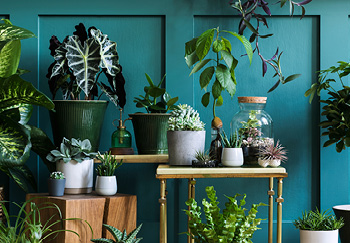
This isn’t just fluff either. There’s a lot of solid academic research from well-known institutions on the benefits of houseplants to us, even NASA sends houseplants up with their astronauts to help filter the air. Further research is always underway, but the consensus is that houseplants do benefit us in a variety of ways.
And even better still, most houseplants are relatively low maintenance, so they will fit in with even the busiest of lifestyles. Interest piqued? Then read on to find out how houseplants can help to improve our wellbeing just by sitting in our homes and workspaces.
The Mental Benefits of Houseplants
Houseplants, with their verdant presence and serene aura, have a profound impact on our mental wellbeing. They are not just decorative but living entities that contribute significantly to creating a healthier and happier living environment. The simple act of being in the company of plants can lead to lower blood pressure and heart rate – two physiological markers often associated with stress and anxiety. The calming green hues of foliage and the gentle sway of leaves foster an atmosphere of tranquillity and peace. This soothing effect helps alleviate our daily stressors, promoting a sense of calmness.
Moreover, interacting with houseplants, such as watering them or pruning their leaves, can serve as a form of mindfulness exercise. These activities require focus and present-moment awareness, which are key components of mindfulness. Engaging in these simple acts of plant care can help anchor the mind, reducing feelings of anxiety further.
In addition, houseplants can foster a sense of accomplishment. Nurturing a plant and watching it grow and thrive provides a sense of satisfaction and achievement, which can boost self-esteem and overall happiness.
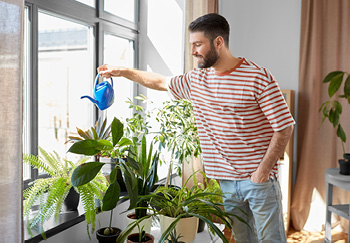
The Emotional Benefits of Houseplants
The very act of caring for a living thing provides a therapeutic effect, diverting our focus from negative thoughts and worries. Tending to plants, watering them, observing their growth; these simple tasks create a sense of calm and can provide relief from anxiety or depressive spells, and the stressors of daily life in a world dominated by screens and technology. They can offer a refreshing, natural break.

Moreover, houseplants have been found to improve overall happiness levels. Their presence can evoke feelings of joy, peace, and contentment. Watching a new leaf unfurl or a bud bloom into a flower can bring immense satisfaction and happiness. This connection with nature within our living spaces can be an incredible mood booster.
Caring for houseplants also imparts a sense of purpose and accomplishment. Nurturing a plant gives us a tangible measure of our efforts and care. This sense of achievement can significantly boost our self-esteem and confidence.
The Physical Benefits of Houseplants
Apart from their mental and emotional benefits, houseplants can also have a positive effect on our physical health. They are known for improving air quality by filtering out pollutants and releasing oxygen into the air which in turn helps us stay healthier and get a better night’s sleep. This is especially beneficial for those living in urban areas with higher levels of pollutants in the air.
For instance, houseplants can improve air quality by up to 30% (depending on the number used) vs a comparable home that has none, and remove Volatile Organic Compounds (VOCs) from your indoor environment. This means removing dust, other particles, and gases such as CO2, benzene, and formaldehyde that might otherwise hang around and irritate your airways, reduce air quality, and even cause a bout of sickness. In studies, NASA has found that houseplants can remove up to 87% of air toxins within 24 hours.

Productivity and Focus Boosters

Houseplants are not just good for our health; they also have a positive impact on our work and study environment by boosting our cognitive function. Studies have shown that having plants in the office or classroom can boost productivity and concentration levels. Indeed, the University of Exeter found that having plants in the workplace increases productivity by 15%. This is because plants help to reduce fatigue and provide a sense of freshness, making it easier for us to focus on tasks.
Boosting Humidity Levels in the Home
One often overlooked benefit of houseplants is their ability to increase indoor humidity. This is particularly beneficial during the winter months when the air can become dry due to heating systems and generally drier winter air. Have you noticed during winter if you’re prone to speckles of blood when blowing your nose? Or do you regularly have a runny nose or itchy eyes? This is down to dry air irritating our nasal passageway and eye surfaces. Houseplants help by releasing water vapour through a process called transpiration, which helps to increase humidity levels in the air. This is not only good for our respiratory health but even for our skin and overall comfort.
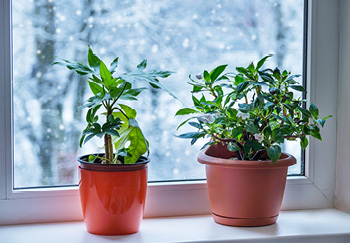
Our Top Houseplant Suggestions for your Home
Here’s our list of some fantastic houseplants that not only add a touch of greenery to your space but also come with the numerous health benefits mentioned already:
Peace Lily
Peace Lilies are exotic and attractive looking because of their large shiny leaves and unusual white flowers. They represent peace, hope and tranquillity. Despite being originally native to South and Central America, Peace Lilies need only a moderate level of light and water. If you want an air purifying workhorse, then this is the one for you.
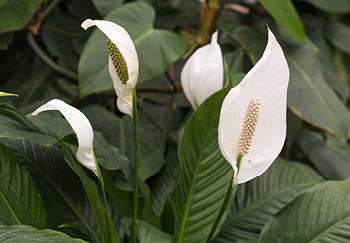
Peace Lilies are great air-purifiers and good for the soul too; in Feng Shui it is said they also purify your aura. Their love for moisture makes them a great addition to bathrooms, but they will look amazing in any spot in the home. Additionally, according to a NASA study, Peace Lilies can filter out harmful toxins like benzene, formaldehyde, and carbon monoxide from the air, contributing to a healthier indoor environment. The Peace Lily’s low-maintenance nature and adaptability to low-light conditions make it an ideal choice for both novice and experienced plant owners.
Snake Plant
Coming in at a similar size as the Peace Lily is the Snake Plant. This plant is tough, tolerating a lot of neglect. But care for them well and they’ll be a fantastic looking plant with their upward growing and patterned leaves. They’ll also filter your air well. The Snake Plant is quite compact in its growth habit even at larger sizes which makes it good for smaller spaces.
They are also very shade-tolerant but still like some light. It’s absolutely perfect for a beginner or those who are extremely busy but still want a great looking plant. This is down to their adaptability to a vast array of growing conditions because they are succulents, which means they store water in their leaves, and this in turn contributes significantly to what makes them resilient to neglect.
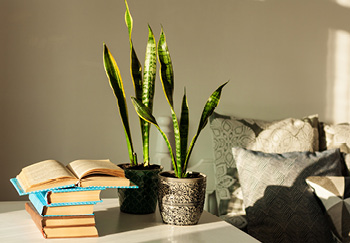
Dracaena

Another great desk plant is the Dracaena known to promote relaxation and reduce stress, along with it’s fantastic air purifying qualities. It’s a fairly neat plant that looks great as the leaves grow predictably off a thick and sturdy stem in an elegantly arranged rosette, so no fusses about sprawling across other décor or office desk. They are a great choice for reducing pollutants in the space and simultaneously being extremely easy to care for.
Aloe Plant
Another great houseplant is the Aloe. Aloe plants are succulents which means they store a lot of water in their leaves. They are a lovely decorative plant, very easy to care for, and can help reduce harmful pollutants like formaldehyde and benzene from the air.
They enjoy the sun and prefer that their soil is completely dry between watering so a nice window spot in a sunny room would be ideal. Aloe is known to help treat skin irritations too and moisturise the skin. It’s said the ancient Egyptians used Aloe Vera for their beauty rituals. How about that!
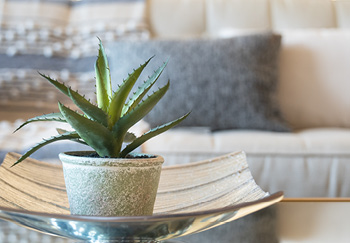
Spider Plant
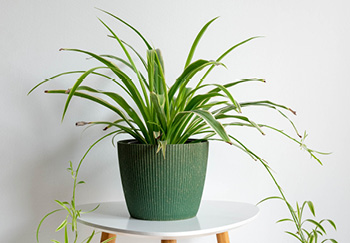
A great choice for air purification, reducing stress and boosting energy levels is the Spider plant. If you have any rooms in your home which are a bit stuffy and dusty, perhaps with poor ventilation compared to other rooms, then the Spider Plant is a terrific option. It has many long, curved, skinny leaves that poke outwards from their pot. They are often displayed in pots on small stands with their long leaves spreading out in all directions. Care for them well and they’ll even make lovely white flowers each spring.
Cacti
The trusty Cactus is another amazing houseplant for wellbeing. Its particular strength lies in absorbing a lot of CO2 from the nearby air. Another fun quality is that it is probably one of the few plants that thrive on neglect; it will withstand the busiest or most forgetful of owners as being a succulent it stores large amounts of water. Try to treat it nicely though. The only thing to note is that it needs a lot of direct sunlight. Cacti are a good choice if space is at a premium too as many varieties are small enough to fit directly on tables and desks without being a bother.
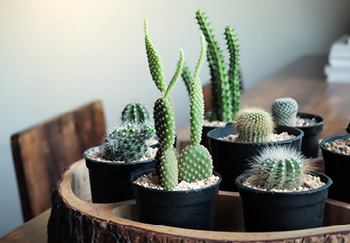
Tender Ferns
Tender Ferns, with their lush, feathery fronds, are a fantastic choice as houseplants. They bring a touch of nature indoors and add a calming, tranquil element to any room. In terms of style, they provide a unique texture and visual interest that can complement any home decor, giving your space a fresh, invigorating feel.
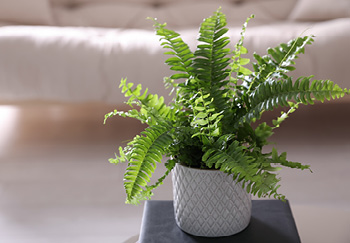
The benefits of Tender Ferns go beyond their aesthetic appeal. They are exceptional air purifiers. According to research, Ferns are efficient at removing toxins such as toluene and xylene from the air. These volatile organic compounds (VOCs) can come from sources like paint, nail polish, and adhesives, and long-term exposure can potentially lead to health issues.
Get Some Houseplants for your Home Today
With everything they can do for us, we think you’ll agree with us when we say that plants are special things. In this case, houseplants are more than just decorative pieces for our homes (even though they look great too); they bring numerous benefits to our mental, emotional, and physical wellbeing. By reducing stress, boosting mood, improving air quality, promoting better sleep, increasing productivity and focus, and providing indoor humidity, they are an essential addition to any living space for our wellbeing. We bet you’re thinking why you didn’t add more sooner! So why not bring some greenery into your home today and reap the many benefits that houseplants have to offer?






